Aging US-Built Fighter Jet Crashes In Iran
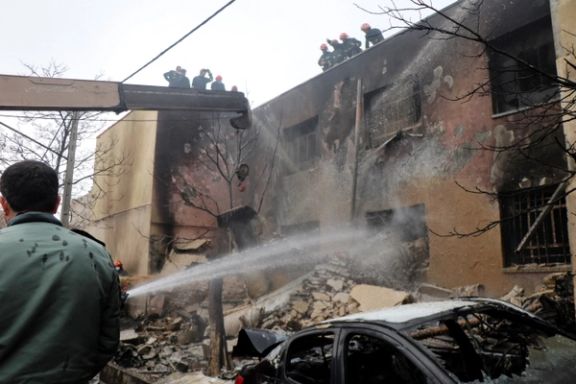
An Iranian F-5 fighter jet has crashed into a stadium in the northwest city of Tabriz Monday morning, killing a civilian and its two pilots.

An Iranian F-5 fighter jet has crashed into a stadium in the northwest city of Tabriz Monday morning, killing a civilian and its two pilots.
The crash happened in a residential area in the center of Tabriz, a city of 1.6 million residents. The third person killed was a passerby in the area.
The accident was followed by a huge fire in central Tabriz, which was put out following the intervention of the firefighters.

According to the commander of the Tabriz air base, General Reza Yousefi, the jet had been used for training while it suffered a technical problem on its final flight. He said that due to the technical problem “pilots could not reach the runway”.
Yousefi claimed that the pilots could have used the ejection system, but they refused to do it and “sacrificed themselves” to guide the jet to the stadium and not crash into a populated area “to keep people safe”.
The jet, however, initially hit the ground of a school according to local reports before crashing into the stadium but the school was closed, and no one was injured or killed there.
Iran’s air force has an assortment of US-made military aircraft purchased before the 1979 Islamic Revolution, which are not considered in optimal condition as decades of Western sanctions have made it hard to maintain the aging fleet.
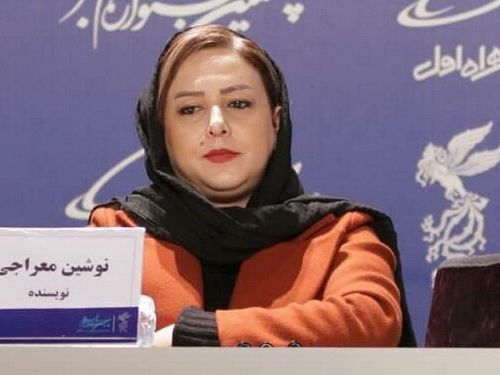
Hardliner clerics and lawmakers in Iran are up in arms for a comment by a screenwriter perceived as condoning male and female partnership without marriage.
The parliament has summoned Culture Minister Mohammad Mehdi Esmaili to offer his explanation about the comments made by a female screenwriter at the closing ceremony of Fajr Film Festival that was meant to celebrate the victory of Iran's Islamic revolution on its 43rd anniversary in mid-February.
In her controversial comments, Noushin Meraji had shyly defended the relationship between the protagonists in her screenplay who were not married but lived together. Hardliners and fundamentalist clerics were quick to raise the cry of blasphemy.
In a video that was released later, Meraji apologized for her comment. She said only 10 seconds of her remarks turned out to be controversial because it was made under huge media pressure during a news conference after the screening of the movie Namour [Damp]. She said what her comment did not mean that a love affair without a marriage was legitimate.
Meraji said in the video that she is a devoted Muslim and a family woman and stressed that she was deeply sorry if her comment led to a misunderstanding. But the temptation to start an outcry was too great for fundamentalists to miss the opportunity.
The Chairman of the Cultural Committee of the Majles, hardline cleric Morteza Aaq-Tehrani, however, said that he has already told the Culture Minister that "such an insult" cannot be tolerated by the Majles. This comes while Esmaili had explained the matter and apologized in a live interview on the state television Saturday night.
In an interview with Tasnim news agency, the lawmaker accused the screenwriter of undermining divine laws. Acknowledging that she had apologized he still insisted that the Minister should come to the Majles to offer his explanation.
In another development, the right-wing association of seminary teachers in a statement lashed out at the screen writer and criticized the Ministry of Culture and Guidance for the "un-Islamic mood" at the festival which "undermined Islamic values including hijab."
Later, female seminarians and Basij militia issued a separate statement condemning Meraji for her remarks. They said in their statement that "The government should slap shameless actresses in the face for their shameless behavior." It appears that the seminarians did not know that Meraji was not an actress. According to the statement, "As far as God is concerned, there is no difference between those who commit a bad act and those who advocate such an act." The statement added that "It is shameful that the festival has advocated adultery.”
However, former conservative lawmaker Ali Motahari criticized Meraji's critics and condemned the controversy surrounding her remarks. Motahari told Nameh News website: "Nearly all of those who criticized Merajicalled for punishing her by slapping her in the mouth or in the face. This is not how Muslim scholars should behave." He called on clerics at the seminary to follow the teachings of his father Ayatollah Mortaza Motahari and respond to controversial statements in a rational way and offer their own argument rather than attacking someone for controversial remarks.
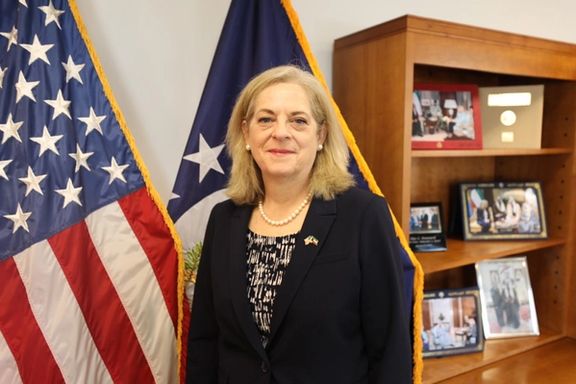
US Ambassador to Kuwait Alina Romanowski has accused Iran of continuing its “destabilizing activities” across the Middle East.
Romanowski, who will soon head to Baghdad after she was nominated as ambassador to Iraq by President Joe Biden, said on Sunday that the Iran’s proxies are a real problem for the stability of the region.
“Iran in our view is promoting very destabilizing activities in the region, which doesn’t help the security of the region; the support they are giving to non-state actors is a real problem in terms of stability”, she told TimesKuwait.
She said Washington is trying to find a solution for the Islamic Republic’s support for Houthis, noting that “Our efforts are focused on assisting people in Yemen on humanitarian grounds, but at the same time in the UAE we are giving support on the defense side”.
About the Biden administration’s indirect nuclear negotiations with Iran in Vienna, she said, “We are in a very delicate time now in this negotiation… We are consulting our partners and allies in the region, and also with the EU. We see that time is running out in terms of finding a solution and our ways to go back to the JCPOA. We have the Iranians as partners too, but at the end of the day, our objective is for us not to see Iran acquiring the capability to further destabilize the region”.
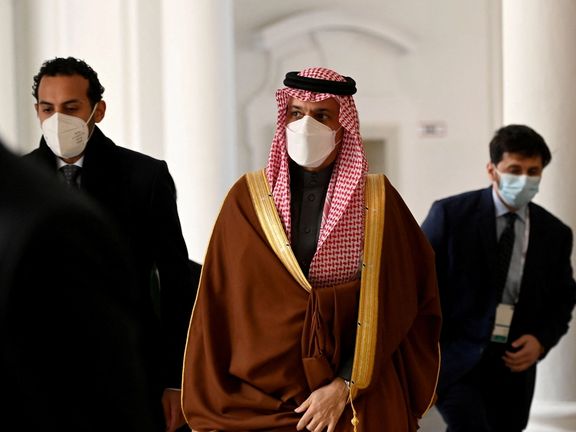
Saudi Arabia's foreign minister said Saturday the kingdom was looking to schedule a fifth round of direct talks with Iran despite a "lack of substantive progress" in previous rounds.
Prince Faisal bin Farhan Al Saud, speaking at the Munich Security Conference, also voiced hope there was a serious desire by Iran to find a "new modus operandi" in the region.
The two countries held talks in April last year with Iraqi mediation. Tehran said the talks were productive, while Riyadh said no serious progress took place.
Iran’s president Ebrahim Raisi who took office last August announced that his government’s priority was to improve relations with regional countries, but no visible change has taken place in Tehran’s regional policies, including support for Houthis in Yemen or militant militias in Iraq and elsewhere.
Sunni Muslim Saudi Arabia and Shi'ite Iran are locked in several proxy conflicts around the region, including in Yemen.
Houthis have continued missile and drone attacks against civilian targets in Saudi Arabia and in January also launched missile strikes against Riyadh’s ally, the United Arab Enirates.
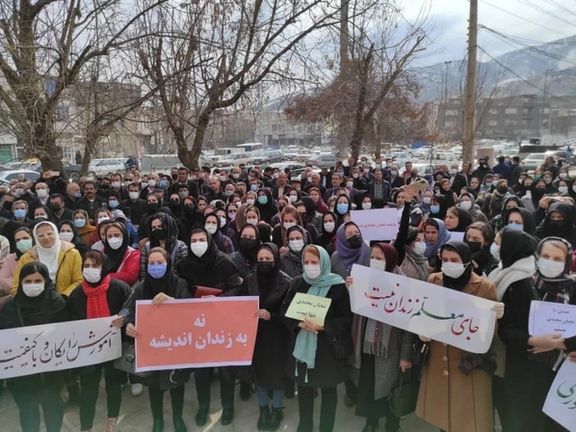
Thousands of teachers staged another round of nationwide protests Saturday to demand higher salaries and the release of colleagues arrested in previous rallies.
The demonstrations were held in at least 100 cities and towns, while teachers have announced their rallies and strikes will continue until Thursday, the end of the week in Iran.
According to Teachers’ Trade Associations, which organized the protests, security forces “attacked” a rally in the city of Karaj, beating teachers and arrested 15 (video) Videos posted on social media show crowds shouting slogans against unfulfilled promises by the authorities and asking for an imprisoned teacher to be freed. “From Tehran to Khorasan; Teachers are in prisons,” they chanted.
As in earlier protests, teachers gathered in front of the parliament building in Tehran and the provincial offices of the education ministry, protesting against ministry directives asking principals to warn teachers not to leave work to take part in protests and sit-ins.
Two years of deep recession in Iran following the introduction of United States ‘maximum pressure’ sanctions in 2018 led to sharp increases in living costs and to labor unrest. According to social media posts, officials in the labor ministry also held a protest Saturday. In January hundreds of firefighters and staff from the judiciary took to the streets in several cities. Prison guards have also picketed to protest their salaries.
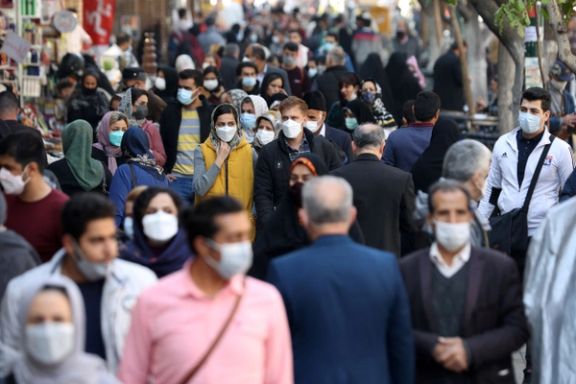
Except for the state-run broadcaster (IRIB), street interviews about controversial issues such as direct negotiations with the US are rare in Iranian media.
But a reformist website, Ensaf News, on Friday published vox pops from several provinces and explained that due to media restrictions it has edited out some of the remarks.
The initiative is quite unique because when it comes to controversial matters, most news websites in Iran do not even allow readers to comment, or edit the comments before publishing, to prevent the closure of their publication by the authorities.
"What are they expecting to happen that they are dallying so much? Why are they delaying it when eventually they will accept to directly talk with the US? Why shouldn't we do it when we can live better if we make a deal with the US, so we won't need Russia and China?", Ensaf News quoted Sattar, a carpenter in Sabzevar in eastern Iran, as saying.
Mohammad-Hesam, a student at Khorasan seminary, told Ensaf News that direct negotiation with the US is banned by Supreme Leader Ali Khamenei because it "entails many harms and no benefit at all." He added that if the US changes its “wolfish behavior” there will not be a problem to "negotiate with the enemy".
A professor of Tabriz University in northwestern Iran whose first name was not mentioned in the article noted the "bitter experience of the JCPOA" during which Iran and the US engaged in direct negotiations with Khamenei's permission, but former US president Donald Trump unilaterally left the deal. He said repetition of that experience is "not only stupid but also treachery". "Authorities should take action against those who still speak about this subject and sadly are not few even in universities," he added.
"The alternative to negotiation with the US is war with that country. Are we prepared for such a war? Even if we are militarily prepared, do we have enough financial resources for such a war? a lawyer in Ahvaz in the southwestern province of Khuzestan, told Ensaf News while Faezeh, a photographer in Tabriz, said what people think and want is clear. "But nobody cares what people want. They do whatever they please," she said.
"To resolve this issue, they must hold a referendum. The most peaceful and legal solution, as long as people and the authorities think differently, is to hold a referendum and let people's vote decide the matter. Rouhani spoke about holding a referendum a few times but did not follow it with action. There wouldn't be so many problems now if a referendum had been held about negotiations between Iran and the US," Saleh, a student at Isfahan University of Technology said according to Ensaf News.
A retired teacher in Isfahan, Nahid, argued that the US is a country like all other countries but has been unduly singled out. "In fact, Israelis hope for the enmity between Iran and the US to continue because it them who profit from it."
Conspiracy theories are abundant too. Mojtaba, a taxi driver in Mashhad, accused the government of secretly negotiating with the US. "The president's visit to Russia was to make a deal with Russia and the US [over Ukraine]. They don't announce it in order not to contradict themselves, otherwise, they have always negotiated behind the scenes and the rest is only a game because they don't want to tell people."